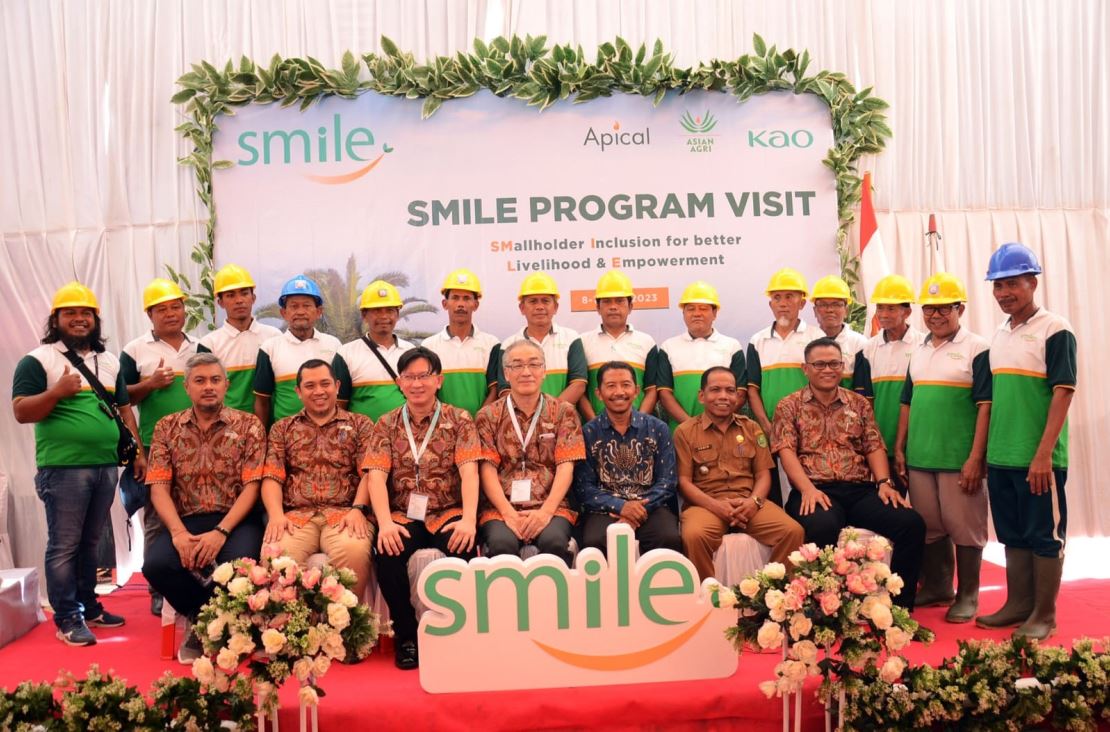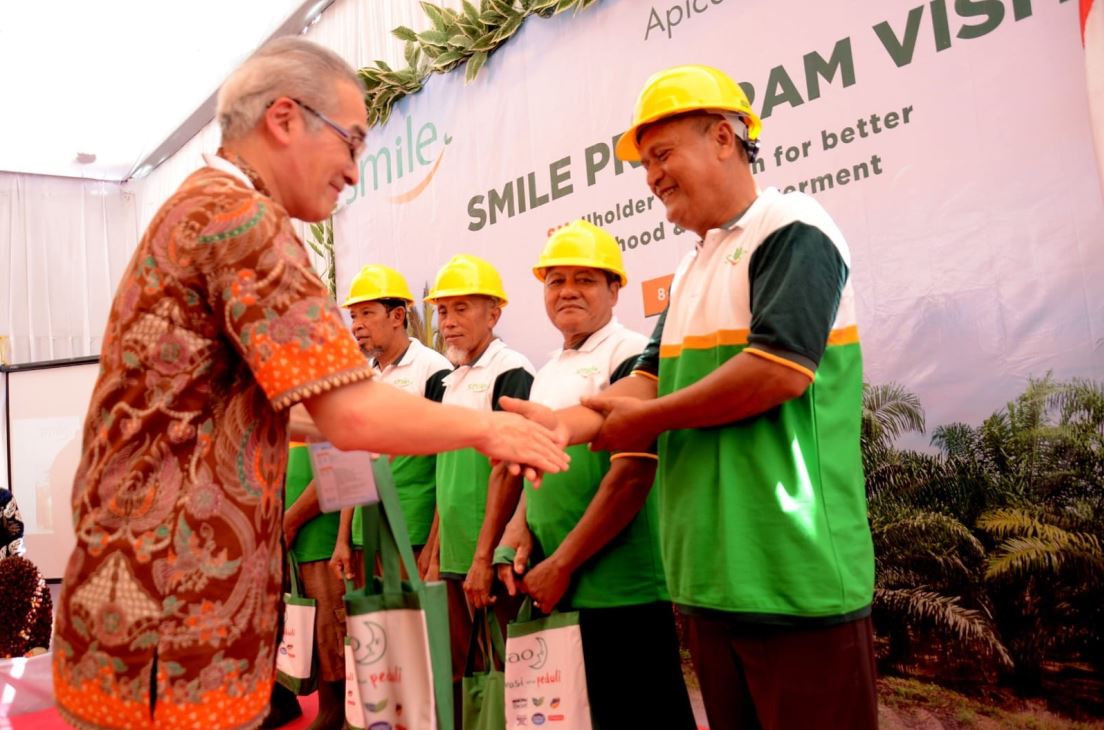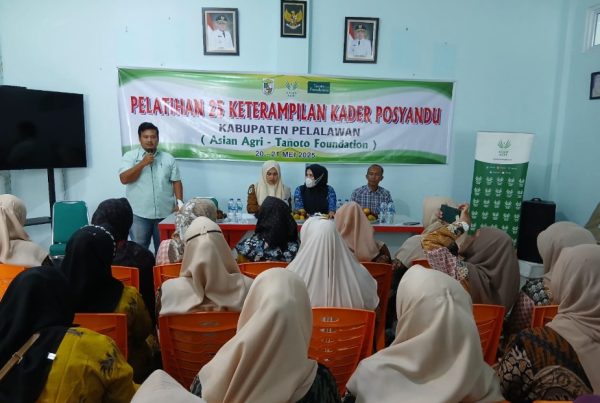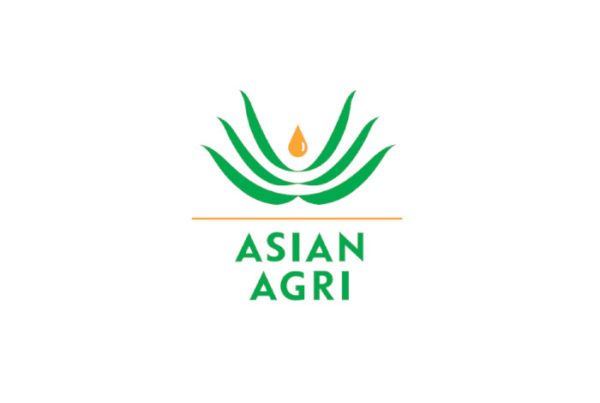Pekanbaru, 9 May 2023 — Smallholders are essential to the industry as they contribute significantly to Indonesia’s total palm oil output. However, the smallholders face significant challenges in order to grow production of palm oil while upholding strict sustainability criteria. In response to these difficulties, Apical, Asian Agri and Kao collaborated and launched the SMallholder Inclusion for better Livelihood & Empowerment (SMILE) programme in 2020. We are pleased to report that SMILE’s efforts to improve the livelihood of smallholders have been fruitful thus far.
Today marks the first time that Apical, Asian Agri and Kao have all travelled together to one of the Koperasi Unit Desa (KUD)s of the smallholders – KUD Anugerah, Riau. The event featured a productive dialogue session with smallholders from the KUD, who were introduced to the SMILE programme and informed of the significant roles performed by Apical, Asian Agri and Kao in the endeavour. The participants also enjoyed a guided tour of the smallholder plantation, school area, and residences of smallholders, which provided valuable insight into the efforts of the local community to promote sustainable agriculture practises.

The SMILE programme has made tremendous strides since its inception in October 2020, with 3,018 smallholders engaged and 390 smallholders certified by the RSPO. The SMILE programme plans to audit three new KUDs in 2023, with participation from approximately 1,105 smallholders in North Sumatra and Jambi. Activities that has been implemented and proven successful thus far, will continue to be conducted throughout the programme, but not limited to:
- Identification of gap-filled measures for RSPO certification requirement;
- Development and support of procedures required for RSPO certification;
- Capacity building and trainings for smallholder groups:
- Improve yield productivity through sustainable GAP
- Implement robust safety measures across their estates to farmers
- Protect and conserve ecosystem and biodiversity including zero-burning practice
- Implement FFB traceability and monitoring by conducting polygon mapping of smallholders’ plantations; and
- Guarantee uptake of smallholders’ FFB at a premium;
The SMILE Programme is tailored to help independent smallholders overcome barriers by lowering the smallholders’ cost by at least 30% and increase yield through access to knowledge, training and resources. Sustainable palm oil produced by participating smallholders will be sold at a premium. By pririotising sustainable and inclusive practices through SMILE, we hope to increase the smallholders’ income, consequently improving their livelihood and foster long-term sustainability.
“We are proud of the positive impact that the SMILE programme has had on smallholders’ livelihoods and the communities in which they live,” said Bremen Yong, the Director of Sustainability at Apical. “We are striving for a more inclusive and sustainable future by giving smallholders the tools to empower and encourage them on practicing responsible agricultural practises.”
The SMILE program combines the strengths of Apical, Asian Agri and Kao to help smallholders improve their livelihoods and empower them to become active participants in sustainable agriculture. Nobuyoshi Yamaguchi, Kao’s Vice president of Procurement expressed enthusiasm in joining the initiative and said, “The SMILE program aligns with Kao’s commitment to sustainability and inclusivity. We are excited to be part of this initiative and look forward to contributing to its success.”
“Through the SMILE programme, we have been able to create positive change in the lives of smallholders,” Ivan Novrizaldie, Asian Agri’s Head of Sustainability said in a statement about the initiative’s results. “By having the smallholders take part in the SMILE Programme through various trainings and audit preparations, we are able to promote awareness on the importance of sustainable practises while bridging the knowledge gap.”
KUD Anugerah’s Head thanked Apical, Asian Agri and Kao for their contributions to the SMILE programme, adding, “We are thankful to Apical, Asian Agri and Kao for the SMILE programme, which has helped us improve our livelihoods and promote sustainable agriculture. We look forward to continuing our collaboration and making strides towards a better tomorrow.”
According to Guntur Cahyo Prabowo, RSPO Acting Head of Smallholder Programme, for solutions to be effective, it is important to make shared responsibility works in practice. “This is why RSPO has been working with our partners in both oil palm producing and consuming regions to keep collaborations as inclusive as possible, and with multi-stakeholder representation that considers all levels of the supply chain and the affected communities. We have stepped up our collaboration with local partners in producing regions to improve smallholder inclusion, so that they can join the sustainable palm oil supply chain and improve their livelihoods. Besides that, RSPO has developed an additional and separate standard, exclusively applicable to independent smallholders. Collective action must be taken to close the gap between the supply and demand of RSPO certified palm oil,” he said.
The SMILE programme complements both Apical2030‘s fourth pillar – Inclusive Progress and Asian Agri2030’s first pillar – Smallholder Partnership. The SMILE programme is working to establish a better future for smallholders and their communities by supporting sustainable and inclusive practises.
About Asian Agri :
Asian Agri is one of Indonesia’s largest palm oil producers. Founded in 1979, the company today manages 100,000 hectares of plantation land and employs over 20,000 people. A pioneer of the Indonesian government’s Trans-National Government Migration (PIR-Trans) program, Asian Agri currently works with 30,000 Scheme smallholders in Riau and Jambi who operate 60,000 hectares of oil palm plantations, and independent smallholders who manage more than 39,000 hectares.
Implementing a strict “no burn” policy since 1994 and best practices in sustainable plantation management, Asian Agri has helped its smallholder partners improve productivity, yield and supply chain traceability, while assisting them obtain certifications. The company’s mills are technologically advanced and energy self-sufficient, minimizing greenhouse gas emissions.
All business units of Asian Agri has the Indonesian Sustainable Palm Oil (ISPO). Currently, all Asian Agri’s plantations in North Sumatra, Riau & Jambi provinces and Scheme smallholder plantations in Riau & Jambi provinces have been 100% RSPO (Roundtable on Sustainable Palm Oil) certified. In addition, ISCC (International Sustainability & Carbon Certification) has been achieved by all plantations owned by Asian Agri and the smallholders it supports.
The company’s operations (CPO mills and KCPs) are ISO 14001 certified, while its Learning Institute and nursery research center in Pelalawan, Riau province, Indonesia are both ISO 9001 certified. Asian Agri’s laboratory at the Center for Research and Development in Tebing Tinggi is accredited by the National Accreditation Committee under the ILAC Mutual Recognition Arrangement (ILAC MRA).
Media Contact Asian Agri :
Corporate Communications, Asian Agri
Email : communications@asianagri.com
About Apical
Apical is a leading vegetable oil processor with an expanding global footprint. Our vertically integrated mid-stream refining and value-added downstream processing makes us an integral supplier that supports the needs of various industries namely food, feed, oleochemicals and renewable fuel, including sustainable aviation fuel (SAF) which enables a great reduction of CO2 emissions.
With integrated assets in strategic locations spanning Indonesia, China and Spain, Apical operates numerous refineries, oleochemical plants, renewable fuel plants and kernel crushing plants. Through joint ventures and strategic partnerships, Apical also has processing and distribution operations in Brazil, India, Pakistan, Philippines, Middle East, Africa, USA and Vietnam.
Apical’s growth is built on the foundations of sustainability and transparency, and motivated by our strong belief that we can contribute to a circular economy for a more meaningful impact, even as we continue to grow our business and deliver innovative solutions to our customers.
For more information, please visit www.apicalgroup.com
Media Contact Apical Group :
Corporate Communications, Apical
Email: corpcomms@apicalgroup.com
About Kao
https://www.kao.com/global/en/





